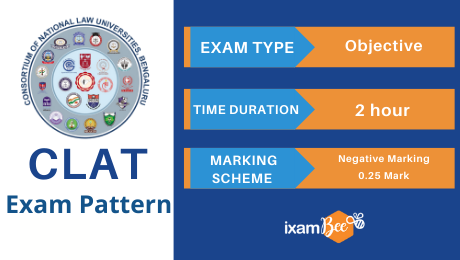Exam Pattern 2025

The CLAT exam 2025 will be conducted in an offline mode. Each section/ subject will have a different number of questions and thus constitute a different percentage of weightage with respect to the overall CLAT exam 2025. The CLAT exam is of 2 hours duration with 150 questions overall for one mark each. Detailed exam pattern for CLAT 2025 exam is given below.
| Sections | Number of Questions | Total Marks | Time Duration |
|---|---|---|---|
| English Language | 150 | 150 | 2 hours |
| Current Affairs, including General Knowledge | |||
| Legal Reasoning | |||
| Logical Reasoning | |||
| Quantitative Techniques |
You can also have a detailed insight into the weightage of questions for every section. The CLAT exam has 5 sections overall so it's obvious that the percentage weightage for every section will differ. Given below is the subject wise weightage of questions in the CLAT exam 2025.
CLAT Section Wise Coverage 2025
Questions in the CLAT exam 2025 are of comprehension type. The CLAT 2025 exam will have various passages based on current affairs, economics, scientific discoveries or somewhat on similar lines followed by a series of multiple-choice questions. You have to choose one option from the given set.
| Subject | Number of Questions (Approx.) |
|---|---|
| English Language | 28-32 questions, or roughly 20% of the paper |
| Current Affairs, including General Knowledge | 35-39 questions, or roughly 25% of the paper |
| Legal Reasoning | 35-39 questions, or roughly 25% of the paper |
| Logical Reasoning | 28-32 questions, or roughly 20% of the paper |
| Quantitative Techniques | 13-17 questions, or roughly 10% of the paper |
The UG CLAT 2025 exam focuses on evaluating your comprehension and reasoning abilities. The paper is designed in such a way so that it can test your aptitude and skills that are necessary for a legal education rather than prior knowledge.
The English Language section of the UG-CLAT will have passages derived from contemporary or historically significant fiction and non-fiction writing. Each passage will be followed by a series of questions. This section basically demonstrates your comprehension and language skills, including your abilities to comprehend the inferences and conclusions.
The Current Affairs including the General Knowledge section will demonstrate your awareness of various aspects of current affairs and general knowledge. The passages will be from news, journals and other non-fiction writing. The questions may include an examination of legal knowledge.
Legal Reasoning will be a test of general awareness of contemporary legal and moral issues. The passages may relate to legal matters, public policy or moral philosophical enquiries. You should be able to identify and infer the rules and principles and apply such rules and principles to various fact situations as per the question demands.
The logical Reasoning of the CLAT exam will have passages of about 300 words each. This section will test how critically you can analyse questions patterns and assess the conclusions that depend on a particular premises. Also how skillfully you can draw relationships and analogies, identify contradictions and equivalence and assess the effectiveness of arguments.
Quantitative Techniques will include short sets of facts or propositions, graphs, or textual, pictorial or diagrammatic representations of numerical information. Here you are required to derive, infer and manipulate numerical information as given in the questions. For this section, to clear your basic concepts along with speed and accuracy matters to a great extent. The more clarity you have, the more you will gain.
Marking Scheme
The number of questions in the CLAT 2025 exam varies for each section and a negative answer will attract a penalty of 0.25 marks. The total number of questions in CLAT 2025 will be 150 for one mark each. Detailed CLAT 2025 exam marking scheme is given below.
CLAT Marking Scheme
| CLAT Marking Scheme | Marks deductions |
|---|---|
| For correct answers | 1 mark |
| For wrong answers | 0.25 marks |
| For not attempted | 0 (no marks) |
Blog
- RBI Grade B Phase 1 Exam Analysis 2025: Difficulty and Success Strategies
- Everything to know about being an RBI Grade B Officer
- Is Coaching Necessary for RBI Grade B Exam? A Self-Study vs Coaching Comparison
- Foreign Banks in India: A Comprehensive Overview
- Ace RBI Grade B Interview with Prachi Agarwal – Part 5



